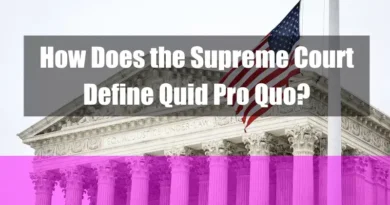Quid Pro Quo Meaning In The Business Law Transactions
In business law, “quid pro quo” is a Latin term meaning “something for something.” It refers to a mutual agreement where each party provides something of value in exchange for another item of comparable worth. This concept ensures that both sides receive fair consideration, which is essential for a valid contract. A common example of a quid pro quo business transaction is bartering, where goods or services are directly exchanged without involving money.
Takeaways
| Key Points |
|---|
| Quid pro quo, meaning “something for something,” is a fundamental principle in business transactions where each party exchanges goods, services, or value to ensure mutual benefit. |
| In business law, this concept is closely tied to consideration, a key element in contract formation that makes agreements legally enforceable, ensuring reciprocal obligations are met. |
| Common examples of quid pro quo arrangements include employment contracts (services for wages), sales agreements (goods for money), and service contracts (expertise for compensation), all of which require clear terms and mutual consent. |
| Ethical considerations are crucial, as fair and transparent exchanges prevent coercion, exploitation, or legal violations, with best practices emphasizing voluntariness, equitability, and adherence to ethical standards. |
| While quid pro quo is distinct from bribery—which involves unethical influence over decisions—legitimate business contracts formalize these exchanges to maintain fairness and legal compliance, ensuring that all parties receive due consideration. |
Definition of Quid Pro Quo in Business Contexts
“Quid pro quo” is a Latin phrase meaning “something for something.” In business contexts, it refers to a reciprocal exchange where one party provides a good or service in return for another of equivalent value. This concept underpins many business transactions, ensuring that each party receives fair consideration for their contribution.
Historical Background
Etymology and Origin of the Term
The term “quid pro quo” originated from Latin, initially implying a substitution of one thing for another. In the 16th century, it was used in apothecaries to describe the replacement of one medicine with another. Over time, its meaning evolved to denote a more general concept of equivalent exchange.
Evolution of Its Usage in Legal and Business Settings
Initially confined to medicinal contexts, “quid pro quo” expanded into legal and business arenas to describe mutual agreements involving the exchange of goods or services. In these settings, it underscores the importance of reciprocity and balance in contractual relationships.
Quid Pro Quo in Business Law
Legal Definition and Framework
In business law, “quid pro quo” refers to the concept of consideration, a fundamental element in contract formation. Consideration involves each party offering something of value, which validates the contract and makes it legally enforceable.
Role of Consideration in Contracts
Consideration ensures that a contract is not merely a one-sided promise but a mutual value exchange. Without consideration, a contract may be deemed void or unenforceable, as there is no evidence of a reciprocal agreement.
Examples of Quid Pro Quo Arrangements in Business Transactions
Examples include employment contracts where services are exchanged for wages; sales agreements trading goods for money, and service contracts, where specific tasks are performed in return for compensation. These arrangements exemplify the quid pro quo principle by ensuring both parties receive agreed-upon benefits.
Quid Pro Quo Business Transactions
Characteristics and Structure
Quid pro quo business transactions are characterized by mutual obligations, clear terms of exchange, and the intent to create binding agreements. They typically involve negotiations to ensure that the exchanged values are perceived as equivalent.
Common Examples in Commercial Practices
- Barter Agreements: Exchanging goods or services without involving money.
- Vendor Contracts: Suppliers provide products in return for payment under agreed terms.
- Consulting Services: Professionals offer expertise in exchange for fees.
Distinctions from Other Transaction Types
Unlike gifts or donations, quid pro quo transactions require reciprocity. Each party must provide something of value, distinguishing these transactions from unilateral arrangements where only one party benefits.
Understanding the concept of quid pro quo is essential in business law, as it ensures fairness and mutual benefit in contractual relationships.
Legal Implications and Considerations
Enforceability of Quid Pro Quo Agreements
In business law, the enforceability of quid pro quo agreements hinges on the principle of consideration, which requires that each party offers something of value in exchange for a reciprocal benefit. This mutual exchange forms the foundation of a legally binding contract. However, if an agreement is excessively one-sided or lacks clear consideration, courts may question its validity and potentially deem it unenforceable. For instance, in some jurisdictions, contracts that appear disproportionately favorable to one party may be scrutinized to ensure that a genuine quid pro quo exists, thereby safeguarding against unjust or inequitable agreements.
Potential Legal Challenges and Disputes
Legal challenges in quid pro quo agreements often arise from ambiguities in contract terms, disparities in bargaining power, or allegations of coercion. Disputes may occur if one party believes that the exchange was not equitable or that the agreed-upon consideration was not provided. Such disagreements can lead to litigation, where courts assess the presence and adequacy of consideration, the clarity of contractual terms, and the conduct of the parties involved to determine the contract’s enforceability. Additionally, if a quid pro quo arrangement involves unethical practices or violates public policy, it may be declared void.
Case Studies Illustrating Legal Outcomes
While specific case studies are not detailed in the provided sources, legal precedents indicate that courts meticulously evaluate the elements of consideration and mutual assent in quid pro quo agreements. For example, in cases where a contract’s fairness is contested, courts examine whether both parties knowingly and willingly entered into the agreement with a clear understanding of the reciprocal obligations. Contracts lacking these elements have been invalidated to prevent unjust enrichment and protect the integrity of contractual relationships.
Ethical Considerations in Quid Pro Quo Arrangements
Ethical Boundaries and Best Practices
Ethical quid pro quo arrangements require transparency, fairness, and mutual consent. Parties should ensure that exchanges do not exploit power imbalances or involve coercion. Best practices include clear communication of terms, equitable valuation of exchanged items or services, and adherence to organizational codes of conduct and societal ethical standards.
Potential for Misuse and Ethical Dilemmas
Quid pro quo arrangements can be misused, leading to ethical dilemmas, particularly when they resemble or facilitate corrupt practices like bribery. For instance, offering something of value to influence someone’s professional actions can blur the line between a legitimate exchange and unethical conduct. Such scenarios can erode trust, damage reputations, and result in legal penalties.
Guidelines for Ethical Quid Pro Quo Practices
- Transparency: Clearly articulate the terms of the exchange to all involved parties.
- Voluntariness: Ensure that all parties willingly participate without undue pressure.
- Equitability: Strive for a fair balance in the value of exchanged goods or services.
- Compliance: Adhere to relevant laws, regulations, and ethical standards governing such transactions.
Quid Pro Quo vs. Other Legal Concepts
Comparison with Bribery and Corruption
While quid pro quo involves a mutual exchange of value, bribery entails offering something of value to influence the actions of someone in a position of power, leading them to act contrary to their duties and ethical obligations. Bribery is inherently unethical and illegal, corrupting decision-making processes and undermining institutional integrity. In contrast, legitimate quid pro quo arrangements are foundational to contractual agreements and, when conducted ethically, do not constitute bribery.
Differentiation from Standard Contractual Agreements
Standard contractual agreements are formalized quid pro quo arrangements where the terms of exchange are explicitly defined and legally enforceable. They outline the obligations and rights of each party, ensuring clarity and recourse in case of disputes. While all contracts involve quid pro quo, not all quid pro quo arrangements are formalized into contracts; some may be informal or implicit understandings without legal binding.
Conclusion
Understanding quid pro quo in business law is essential for recognizing the foundations of contractual agreements and distinguishing them from unethical practices like bribery. Ensuring that such arrangements are entered into voluntarily, transparently, and equitably upholds both legal standards and ethical principles, fostering trust and integrity in business dealings.
FAQ
What does ‘quid pro quo’ mean in business law?
In business law, ‘quid pro quo’ is a Latin term meaning ‘something for something.’ It refers to a mutual agreement where each party provides something of value in exchange for something else of comparable value. This concept ensures that contracts are based on reciprocal obligations.
How does quid pro quo apply to business transactions?
Quid pro quo applies to business transactions by ensuring that each party receives a benefit in exchange for their contribution. For example, a company might offer a discount to a retailer in return for prominent product placement, benefiting both parties.
Is quid pro quo necessary for a contract to be valid?
Yes, quid pro quo, known as ‘consideration,’ is essential for contract validity. It ensures that each party offers something of value, making the agreement binding and enforceable. Without consideration, a contract may be deemed void.
Can quid pro quo arrangements be unethical in business?
While quid pro quo is standard in business, it can be unethical if it involves bribery, coercion, or conflicts of interest. For instance, offering personal favors to influence business decisions violates ethical standards and legal regulations.
What are some examples of quid pro quo in business settings?
Examples include bartering services between companies, exchanging discounts for bulk purchases, or reciprocal advertising agreements. Each party provides value in return for a benefit, fostering mutual advantage.
How does quid pro quo relate to employment law?
In employment law, quid pro quo often refers to situations where job benefits are conditioned on personal favors, such as promotions, in exchange for inappropriate requests. Such practices are illegal and constitute harassment.
Are verbal quid pro quo agreements legally binding?
Verbal quid pro quo agreements can be legally binding if they include clear terms and mutual consent. However, written contracts are preferable as they provide tangible evidence of the agreement, reducing potential disputes.
What is the difference between quid pro quo and a gift in business?
Quid pro quo involves a reciprocal exchange where both parties benefit, while a gift is given without expecting anything in return. Understanding this distinction is crucial to avoid legal issues related to bribery or unethical conduct.
How can businesses ensure ethical quid pro quo practices?
Businesses can ensure ethical quid pro quo practices by establishing transparent policies, providing ethics training, and implementing compliance programs. Regular audits and a clear code of conduct help maintain integrity in transactions.
What are the legal consequences of unethical quid pro quo arrangements?
Unethical quid pro quo arrangements can lead to legal consequences such as fines, penalties, and reputational damage. In severe cases, individuals or companies may face criminal charges, leading to imprisonment or business closure.









